|
|
|
Sort Order |
|
|
|
Items / Page
|
|
|
|
|
|
|
| Srl | Item |
| 1 |
ID:
139333
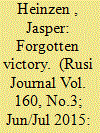

|
|
|
|
|
| Summary/Abstract |
Waterloo has always been overshadowed by the 1813 Battle of Leipzig in German national memory. Given the salient contribution of Prussian, Hanoverian, Brunswick and Nassau troops to the final victory over Napoleon, this reticence may at first glance seem surprising. Jasper Heinzen contends that Waterloo failed to become a symbol of national achievement in the nineteenth century because of the regional and political fissures it laid bare. If the First World War produced a consensus at last, the price was a subversion of the Anglo-German comradeship so integral to the original event. The resulting mnemonic distortions and, since the Second World War, Franco-German partnership have served to keep Waterloo on the sidelines, yet the battle still holds important lessons for policy-makers today.
|
|
|
|
|
|
|
|
|
|
|
|
|
|
|
|
| 2 |
ID:
139327


|
|
|
|
|
| Summary/Abstract |
Over the past 150 years, terrorist organisations around the world have adopted a similar range of core tactics to advance their cause, including the provocation of states into an overreaction to the threat posed by terrorism. In doing so, states fall into a deliberate trap set by the terrorists, with their own actions ultimately undermining their legitimacy to govern. Tom Parker argues that terrorist groups have been remarkably open and consistently candid about their intentions to capitalise on this weakness and that it is time that governments – and the societies they preside over – begin to benefit from their candour.
|
|
|
|
|
|
|
|
|
|
|
|
|
|
|
|
| 3 |
ID:
139331
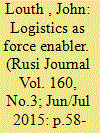

|
|
|
|
|
| Summary/Abstract |
The provision of defence logistics is determined by a complex relationship between public and private actors. John Louth explores the current debate, challenges and opportunities inherent in the defence logistics model in use in the UK, and the business management system required for the continued delivery of this key enabler of defence and security in the future.
|
|
|
|
|
|
|
|
|
|
|
|
|
|
|
|
| 4 |
ID:
139323
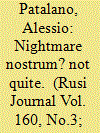

|
|
|
|
|
| Summary/Abstract |
The very human consequences of the migrant crisis in the Mediterranean Sea have dominated recent headlines, as the number attempting the treacherous crossing from Africa to Europe has significantly increased in tandem with the minor improvement in conditions at sea. The question of how to tackle this problem has also featured prominently on the EU agenda, given that its current border-patrol mission, Operation Triton, was not designed to respond to the humanitarian challenges posed by the phenomenon. In this article, Alessio Patalano considers the lessons that can be drawn from Triton’s predecessor, Operation Mare Nostrum, a year-long effort led by the Italian navy to rescue migrants, which came to an end in October 2014.
|
|
|
|
|
|
|
|
|
|
|
|
|
|
|
|
| 5 |
ID:
139326
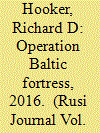

|
|
|
|
|
| Summary/Abstract |
The Russian intervention in Ukraine can be seen not as an isolated incident, but as part of a larger strategy aimed at re-establishing Russian control and influence over its near abroad – a sphere of influence severely diminished with the fall of the Berlin Wall. Building on its success in Georgia, the Russian Federation moved aggressively in 2014 to seize Crimea and destabilise eastern Ukraine. In each case, Russia leveraged ethnic Russian populations to encourage separatist movements, introducing Russian paramilitaries, intelligence operatives, special forces and eventually conventional forces. In this hypothetical scenario, written as a ‘historical perspective’, Richard D Hooker, Jr examines a possible next move against the Baltic States, where similar conditions apply. Should Russia move against the Baltics, NATO will face its most challenging test in a generation.
|
|
|
|
|
|
|
|
|
|
|
|
|
|
|
|
| 6 |
ID:
139335


|
|
|
|
|
| Summary/Abstract |
Much of contemporary society's memory of war is built on artistic interpretations of the historical experience of conflict and trauma, rather than the official commemorations that often take centre stage.
|
|
|
|
|
|
|
|
|
|
|
|
|
|
|
|
| 7 |
ID:
139325
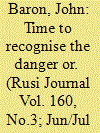

|
|
|
|
|
| Summary/Abstract |
As policy-makers around the globe come to terms with an altogether more complicated international landscape, marked by the rise and increasing assertiveness of new powers and the growing importance of non-state actors, it is ever-more important that foreign policy is underpinned by robust strategic thinking. In this article, John Baron explores the costs of cuts to the Foreign Office and defence budgets, deploring the adverse effects not only on the UK's hard and soft power, but also on its strategy-making.
|
|
|
|
|
|
|
|
|
|
|
|
|
|
|
|
| 8 |
ID:
139328


|
|
|
|
|
| Summary/Abstract |
The relationship between weapon technology and the personnel who use it is a fascinating subject deserving of in-depth scrutiny, especially in an age when automation seems a preferred option of military leaders. Sophie Lefeez interviewed French army personnel who have used the Milan and Javelin missile systems to explore the relationship between operators’ familiarity with a weapon system and the system's adaptability to different uses and environments.
|
|
|
|
|
|
|
|
|
|
|
|
|
|
|
|
| 9 |
ID:
139330


|
|
|
|
|
| Summary/Abstract |
The relationship between weapon technology and the personnel who use it is a fascinating subject deserving of in-depth scrutiny, especially in an age when automation seems a preferred option of military leaders. Sophie Lefeez interviewed French army personnel who have used the Milan and Javelin missile systems to explore the relationship between operators’ familiarity with a weapon system and the system's adaptability to different uses and environments.
|
|
|
|
|
|
|
|
|
|
|
|
|
|
|
|
| 10 |
ID:
139332


|
|
|
|
|
| Summary/Abstract |
The Battle of Waterloo marked the end of a protracted European conflict that had lasted for twenty-three years. This period witnessed the seemingly inexorable rise of Napoleon, first to the position of general, then consul and finally emperor. It saw him face several kaleidoscopic coalitions of European powers, experience victory and defeat in battle, suffer exile, and return to rally France once again during the famous Hundred Days that ended at Waterloo. The question as to why this most famous of military strategists was defeated in June 1815 has long been a source of debate. Here, Beatrice Heuser explores the reasons why he lost the battle and – ultimately – the war, concluding that this was due to a broader failure of strategic vision on Napoleon's part.
|
|
|
|
|
|
|
|
|
|
|
|
|
|
|
|
| 11 |
ID:
139334


|
|
|
|
|
| Summary/Abstract |
By bringing the Napoleonic Wars to an end, the Battle of Waterloo gave the last impetus to an ongoing upheaval that, in little over a decade, dislocated a centuries-old global Iberian world. To a limited extent, it also contributed to the unleashing of an era of civil war that resulted in the secession of most of the Spanish American dominions and fuelled the ideological battleground between conservative and progressive, centralist and decentralist forces. Portugal fared no better, troubled by domestic crises and the eventual unravelling of the Lusitanian Empire through the emergence of an independent Brazil.
|
|
|
|
|
|
|
|
|
|
|
|
|
|
|
|
| 12 |
ID:
139324


|
|
|
|
|
| Summary/Abstract |
A common assumption in the West is that distance and space are no longer key considerations in strategy and politics. ‘Over there’, the argument goes, can quickly and dangerously become ‘over here’. Yet, as Patrick Porter contends, this is a dangerous fallacy that distorts Western strategy. A proper consideration of the role of distance should not lead to disengagement or isolation, but rather to a more selective and considered – and thus more flexible – foreign and security policy.
|
|
|
|
|
|
|
|
|
|
|
|
|
|
|
|
|
|
|
|
|